|
2/24/2023 4 Comments The Best That You Can Do*
* Not just the words to a Christopher Cross/Burt Bacharach/Carole Bayer Sager/Peter Allen song.
Sorry. I had to.
Wait, strike that. I'm not sorry. 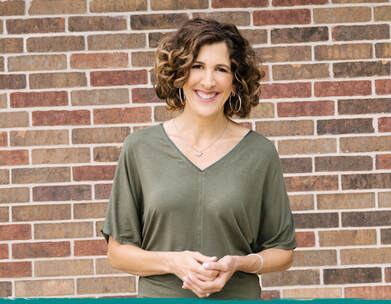 Tiffany Yates Martin, a book editor who also writes under the name Phoebe Fox. (FoxPrint Editorial) Tiffany Yates Martin, a book editor who also writes under the name Phoebe Fox. (FoxPrint Editorial)
The possible mechanical aspects of the writing life—what to write, when to write, what time to write, how much to write, etc.—are so many and so varied that I've discovered I can disagree with just about anything, given the opportunity to formulate a contrary opinion or just to wake up in a mood.
But once in a while, something crosses my desk or screen that inspires nothing but rabid agreement in me. My friend Tiffany Yates Martin—in fairness, my wife's editor on several projects, but I joined the two of them for a memorable and hilarious lunch in Austin, so I'm claiming her—wrote just such a piece earlier this week. You can read it for yourself, but here are just a couple of the stellar observations: I think there’s danger in talking about our writing in a diminishing way. Most obviously it sends us the message that our creative work isn’t that important or worthwhile. It’s just a lark, a silly little whim we pursue, but we’re not kidding ourselves that we can stand beside the actual greats of literature. And ... That means having a clear-eyed view of your work and where there may be room for improvement and growth, while also allowing yourself to be proud of its merits and strengths. Without that how can we hope to improve as artists, any more than a child who is given nothing but criticism and disapproval can develop a healthy self-image and flourish? We have to create a safe space for ourselves as artists where we have permission to fail, permission to grow. Seriously, if you are one of those "oh, I just write [whatever]" or "I just dabble" writers, go read Tiffany's piece and see if, perhaps, there's a way to recast your thinking into something that's realistic and celebratory. You create things. You conjure stories and experiences. You're awesome. Never forget it. 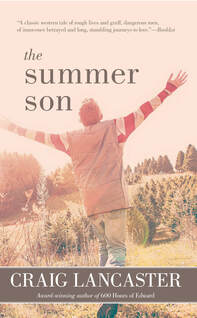
Years ago, after my second novel, The Summer Son, came out, it landed reviews in two regional publications that I fervently hoped would shower it with praise. I was riding high, at least from a critical standpoint, having seen my debut, 600 Hours of Edward, receive wide praise and some nice awards. I thought I'd written an even better book with The Summer Son, so I readied myself for an onslaught of plaudits.
The novel went 0-for-2 in redeeming those hopes. The review in New West was generally complimentary but cast the book as falling short of its predecessor. The review in the Missoula Independent was more of a split-personality assessment—which, interestingly, is what the reviewer accused my book of having—with effusive praise for the character development and something bordering on ridicule for the plotting. I know what my reaction was, in both cases: something deeper than disappointment and a bit short of despondency. (I suppose I'm blessed/cursed by not really giving a damn what you think of me, but I get a little bruised when my work isn't seen favorably.) It was fascinating to see reactions from my friends and colleagues. A couple called me to make sure I was OK. One told me the Independent piece was an unqualified great review, a point of view I had a little trouble accessing. (Her point, I believe, is that character development is the gold standard of literary work, and I'd won the critic over with that part of my effort. OK, then.) The point of all this isn't to indulge in ancient grudges, although if I were so inclined, I'd point out that both New West and the Independent are dead and The Summer Son still puts money in my pocket every month, so chomp on that, fellas. But I am not so inclined. The fact is, the literary life of the West is poorer for those publications' absence, no matter how wrong they were on occasion. (OK, maybe just a little jab.) No, seriously, my point is this, and it's one I've made again and again: If you want something you can influence with regard to your work, better to forget how it'll be received, whether it will sell, if it'll make you rich, and put all of your attention on doing the absolute best work you're capable of undertaking at the time you undertake it. If you do that, if you're certain it's the best that you can do, you will owe no one anything. You will owe only yourself, and only this: growth, the gumption to try even harder the next time, a willingness to stretch yourself beyond what you think is possible. Some years after those reviews, I was talking with the guy who wrote the one for New West, a good friend of mine and a damn fine writer, and told him he'd certainly been right about certain things. I'd grown. I could see flaws I didn't see at the time I wrote it. I said something like "if I could do it over again, I would." And he set me straight: "Don't ever say that about your own work. Don't ever put it down." Absolutely right. You made that. Love it for what it is. Save "I should have done better" for next time, then do it.
4 Comments
2/19/2023 4 Comments Compromising with the ClockI'm more than a month into my new full-time job--more on that here—and have settled into a rhythm that both suits and serves me. This weekend has been the first time in that month-plus that I've been able to turn my attention to my current manuscript, which makes it, perhaps, a longer absence than I anticipated. But, hey, career changes are big deals. My focus has been in the right place. The biggest change, aside from the parameters of the job, has been to my sleep schedule. I've spent the preponderance of a career as a swing-shifter—4 or 5 p.m. to midnight or 1 a.m. In my younger days, I embraced the full inversion of that schedule. I'd come home, make dinner, fire up the TV, talk on the phone, whatever, then go to bed around 5 a.m. or 6 a.m. Wake up after noon, eat breakfast, head off to work. Lather, rinse, repeat. Later on, I realized how much of the day was getting away from me that way and adjusted. Home, directly to bed, wake up at 7 a.m. or so, have hours and hours to my own devices before I headed to work. I wrote a lot of novels that way. Back in January, my thinking was along these lines: I'll wake up at 5:45 a.m., write, eat breakfast, then start my workday. 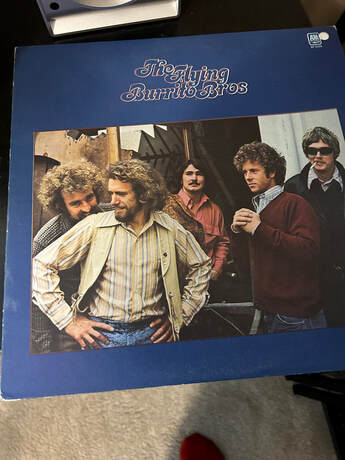 It hasn't worked out that way. Oh, I'm waking up early. And I'm answering email, paying bills, doing whatever can be done when much of the world is asleep, then reporting to duty in my sweet home office. (Seriously, my office is the BEST. I'm sitting here at the short end of the L-shaped desk, writing this as a warmup to today's work on the manuscript, and listening to the Flying Burrito Brothers on vinyl. You tell me how life could possibly be better. I dare you.) When I get off work in the early evening, I'm too fried to write. I eat, I visit my dad, I tend to small errands, then I trudge upstairs for another go-round with Mr. Sandman. Can't write in the morning, so what to do? Easy. Write on weekends. I have no absence of motivation to do so, and no absence of weekends to put those writing hours into. Point is, I can write a lot of novels this way, too. 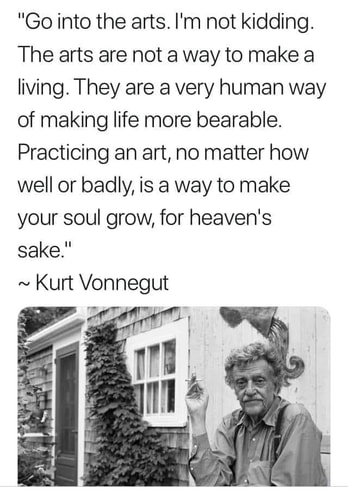 The whole thing puts me in mind of a meme I shared on Facebook this past week, one that got a lot of traction with my artist-heavy social group. And it's something, perhaps, I don't focus on enough when I'm putting my hopes on this book or that book to connect widely and to ratchet down the financial pressures of daily American life. I don't do it for money. And I say that in a non-starry-eyed way, and in a way that's not too idealistic for my own good. The point is that being compelled toward the arts comes from a deeper place, a deeper need to make sense of the world and to contribute something to it that doesn't traffic in cynicism and power. Do I wish I had a better nose for generating straight cash, or that maybe I'd made different decisions along the way that would have augured more to the benefit of my bottom line? Sure. Absolutely I do. But I'm not dead yet. There's still time. Once I started getting comfortable with the multiplicity of ways I can define myself, it released me to embrace my multitudes. I can be an analyst and a content specialist. I can be a friend and a husband. I can be a brother and a son and an uncle. And, damn right, I can be an artist on my terms, in my time, trying to make a contribution from my cozy little office with a turntable and a drink fridge. I not only can but also am gonna. Just watch me. |
About CraigCraig Lancaster is an author, an editor, a publication designer, a layabout, a largely frustrated Dallas Mavericks fan, an eater of breakfast, a dreamer of dreams, a husband, a brother, a son, an uncle. And most of all, a man who values a T-shirt. Archives
July 2024
By categoryAll 600 Hours Of Edward And It Will Be A Beautiful Life Awards Books Bookstores Community Connection Craft Craig Reads The Classics Dreaming Northward Education Edward Adrift Family Geography History Libraries Memory Montana NaNoWriMo Northward Dreams People Plays Poetry Public Policy Q&A Social Media Sports Stage Texas The Fallow Season Of Hugo Hunter The Summer Son This Is What I Want Time Travel Work Writers Writing Archives
July 2024
|
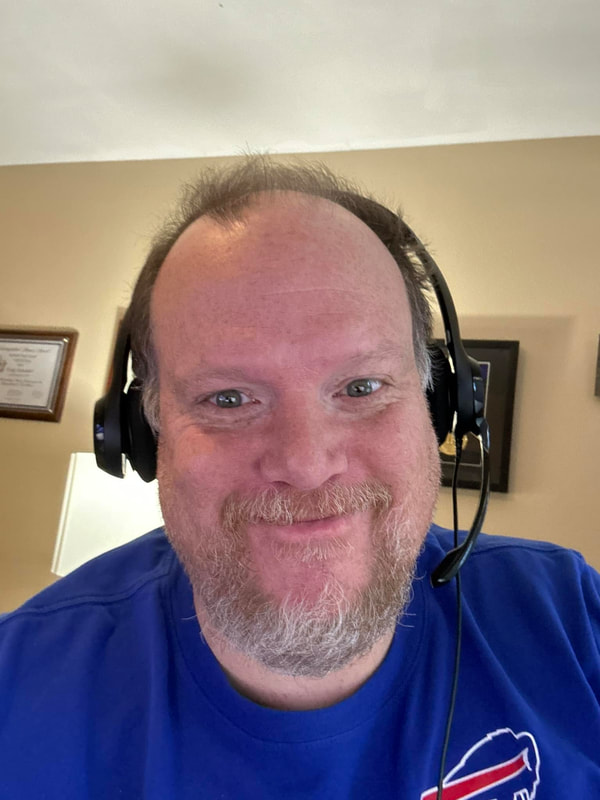
 RSS Feed
RSS Feed